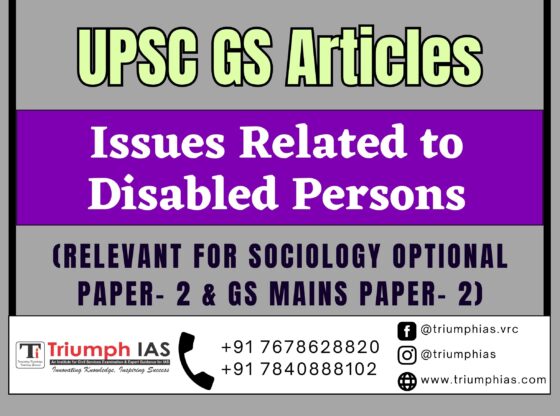Issues Related to Disabled Persons
Relevant for sociology optional Paper- 2 & GS Mains Paper- 2

The issue of disabled persons is a critical one that needs to be addressed urgently in India. Despite several policies and initiatives taken by the government, there is still a long way to go to ensure that disabled persons are treated with the dignity and respect they deserve.
One of the most significant issues faced by disabled persons is discrimination. Disabled persons are often treated as inferior and are subjected to social exclusion, which severely impacts their ability to lead a meaningful life. This discrimination can manifest in many ways, such as the denial of access to public spaces, education, and employment opportunities.
According to the Census of India 2011, there are over 2.68 crore disabled persons in India, accounting for 2.21% of the population. However, the actual number may be much higher as many disabled persons remain unaccounted for due to underreporting or lack of access to resources. These individuals face significant challenges in their daily lives due to the lack of accessible infrastructure and basic amenities.
Another major issue faced by disabled persons is the lack of accessibility in public spaces. Despite guidelines and regulations mandating accessible infrastructure for persons with disabilities, the implementation remains inadequate. This lack of accessibility makes it challenging for disabled persons to access public spaces such as parks, public transport, and buildings, restricting their mobility and independence.
Education is another area where disabled persons face significant challenges. Despite the Right to Education Act 2009, which mandates free and compulsory education for children with disabilities, many schools remain inaccessible to disabled children. The lack of trained teachers and the absence of assistive technology further limits the educational opportunities for disabled children, leaving them with limited career prospects.
Employment is also a significant area of concern for disabled persons. Despite affirmative action policies and reservations in government jobs, disabled persons continue to face discrimination in the private sector. The lack of accessibility and reasonable accommodations in the workplace limits the opportunities for disabled persons to enter the workforce, leading to financial insecurity and social exclusion.
The lack of awareness and sensitivity towards disability is another issue that needs to be addressed urgently. Disability is often stigmatized, leading to negative attitudes and stereotypes towards disabled persons. This stigma can manifest in the form of verbal abuse, bullying, and physical violence, further isolating disabled persons and impacting their mental health.
Mental health is a crucial aspect of disability that is often overlooked. Disabled persons are at a higher risk of developing mental health conditions such as depression and anxiety due to the social exclusion and discrimination they face. The lack of accessible mental health services and the stigma attached to seeking help further compounds the issue, leading to underreporting and inadequate treatment.
The issue of disability is compounded by intersecting factors such as gender, caste, and socio-economic status. Women with disabilities, for instance, face multiple forms of discrimination and violence, limiting their access to education, employment, and healthcare. Similarly, disabled persons from marginalized communities such as Dalits and Adivasis face compounded discrimination, limiting their opportunities for social and economic mobility.
To address the issues related to disabled persons, it is crucial to adopt a multi-pronged approach that addresses the systemic and societal barriers that limit their opportunities. The government must ensure the effective implementation of policies and regulations that mandate accessibility and reasonable accommodations in public spaces, education, and employment. This would require investing in infrastructure and technology that would enhance the accessibility and mobility of disabled persons.
Education and employment opportunities must be made accessible and inclusive, with adequate training and resources provided to teachers and employers to support disabled persons. Mental health services must be made accessible and destigmatized, with adequate resources allocated to ensure that disabled persons have access to the support they need.
To address the issue of discrimination, it is crucial to raise awareness and sensitization towards disability. This can be achieved through community outreach programs and media campaigns that challenge negative attitudes and stereotypes. It is also essential to involve disabled persons in decision-making processes and policy formulation to ensure that their voices and perspectives are represented. Disability rights organizations must be empowered to advocate for the rights of disabled persons and hold the government accountable for the effective implementation of policies and regulations.
In conclusion, the issue of disabled persons is a critical one that requires urgent attention and action. Disability is not a personal tragedy but a social issue that requires collective responsibility and action to address. By adopting a multi-pronged approach that addresses systemic and societal barriers, we can create a more inclusive and accessible society that ensures the dignity and rights of disabled persons. It is imperative that we prioritize the needs and rights of disabled persons to ensure that no one is left behind in our pursuit of progress and development.
For more such free UPSC notes, Articles, News & Views Join our Telegram Channel. https://t.me/triumphias
Click the link below to see the details about the UPSC – Civils courses offered by Triumph IAS. https://triumphias.com/pages-all-courses.php


